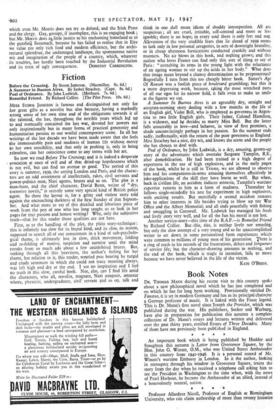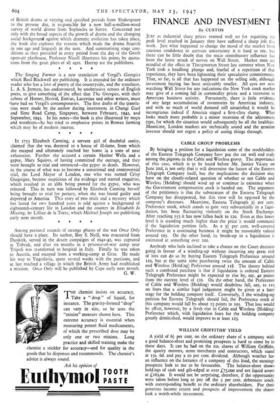Book Notes .
DR. THOMAS MANN during his recent visit to this country spoke about a new philosophical novel which he has just completed and on which he has for long been working. Provisionally entitled Dr. Faustus, it is set in modern Germany and has as its principal character a German professor of music. It is linked with the Faust legend. This is Dr. Mann'_s first novel since 7oseph the Provider, which was published during the war. His publishers, Seeker and Warburg, have also in preparation for publication this autumn a complete collection of Dr. Mann's essays and lectures written and delivered over the past thirty years, entitled Essays of Three Decades. Many of them have not previously been published in England.
* * * * An important book which is being published by Hodder and Stoughton this autumn is Letter from Grosvenor Square, by the Hon. John G. Winant, 0.M., who was United States Ambassador in this country from 1941-1946. It is a personal record of Mr. Winant's wartime Embassy in London. In it the author, looking in retrospect through his window in Grosvenor Square, traces the story from the day when he received a telephone call asking him to see the President in Washington to the time when, with the news of Pearl Harbour, he became the Ambassador of anallied, instead of a benevolently neutral, nation.
* * * Professor Allardyce Nicoll, Professor of Fnglish at Birmingham University, who can claim authorship of more than twenty histories of British drama at varying and specified periods from Shakespeare to the present day, is responsible for a new half-a-million-word survey of world drama from Sophocles to Sartre. Concerned not only with the broad aspects of the growth of drama and the changing social background against which dramatic evolution has taken place, the book also explores the reasons' which made the drama flourish in one age and languish in the next. " And summarising stage con- ditions as they prevailed in every period from the day of the Greek open-air playhouse, Professor Nicoll illustrates his points by quota- tions from the great plays of all ages. Harrap are the publishers.
The- Singing Farmer is a new translation of Vergil's Georgics which Basil Blackwell are publishing. It is intended for the ordinary reader who has a love of poetry of the countryside, and the translator. L. A. S. Jermyn, has endeavoured, by unobtrusive echoes of English poets, to give something of the effect that The Georgics, with their echoes of Homer, Hesiod, Ennius, Lucretius and other writers, must • have had on Vergil's contemporaries. The first drafts of the transla- tion were made by the author during internment in Changi Gaol and Sime Road Camp, Singapore, between February, 1942, and September, 1945. In his notes—the book is also illustrated by maps and woodcuts—he has tried to emphasise points in Roman farming which may be of modern interest.
* * * * In 1753 Elizabeth Canning, a servant girl of doubtful sanity, claimed that she was decoyed to a house of ill-fame, from which she escaped and ultimately reached her home in a state of near exhaustion. Further she accused a certain Mother Wells and a gypsy, Mary Squires, of having committed the outrage, and they were brought to trial and sentenced—the gypsy to death. However, in the course of what was to become a sensational and controversial trial, the Lord Mayor of London, one who was named Crisp Gasgoigne, became suspicious of the evidence and started enquiries, which resulted in an alibi being proved for the gypsy, who was released. This in turn was followed by Elizabeth Canning herself being brought to trial for perjury, when she was found guilty and deported to America. This story of two trials and a mystery which has lasted for two hundred years is told against a background of eighteenth-century life in London and the country in Elizabeth Is Missing, by Lillian de la Torre, which Michael Joseph are publishing early next month. * * * * Among personal records of strange phases of the war Once Only should have a place. Its author, Roy S. Neill, was evacuated from Dunkirk, served in the desert campaigns of 1941-42, was captured at Tobruk, and after six months in a prisoner-of-war camp near Tripoli was transferred to hospital in Italy. Finally he was taken to Austria, and escaped from a working-camp at Graz. He made his way to Yugoslavia, spent several weeks with the partisans, and at last reached a village in which the British Army had established a mission. Once Only will be published by Cape early next month.
G. W.



































 Previous page
Previous page